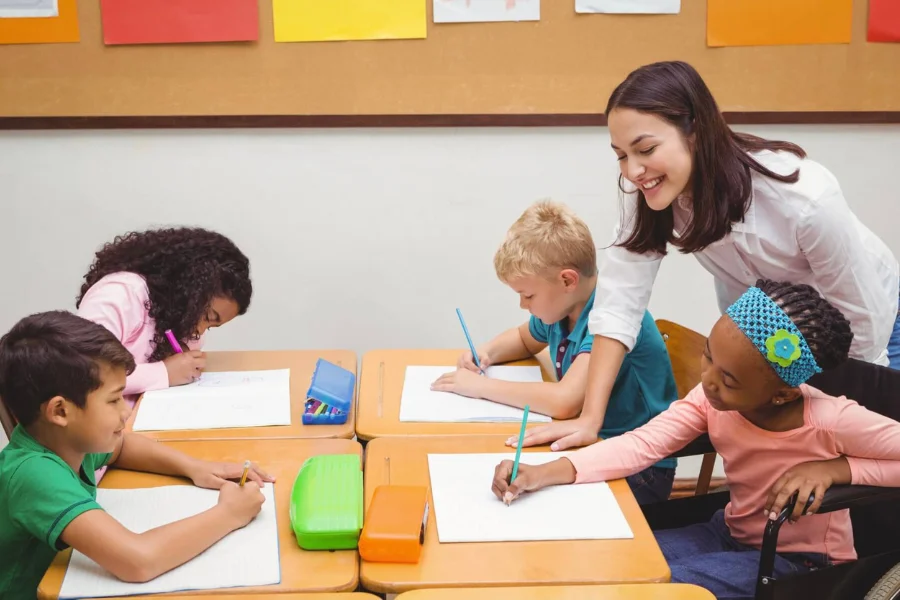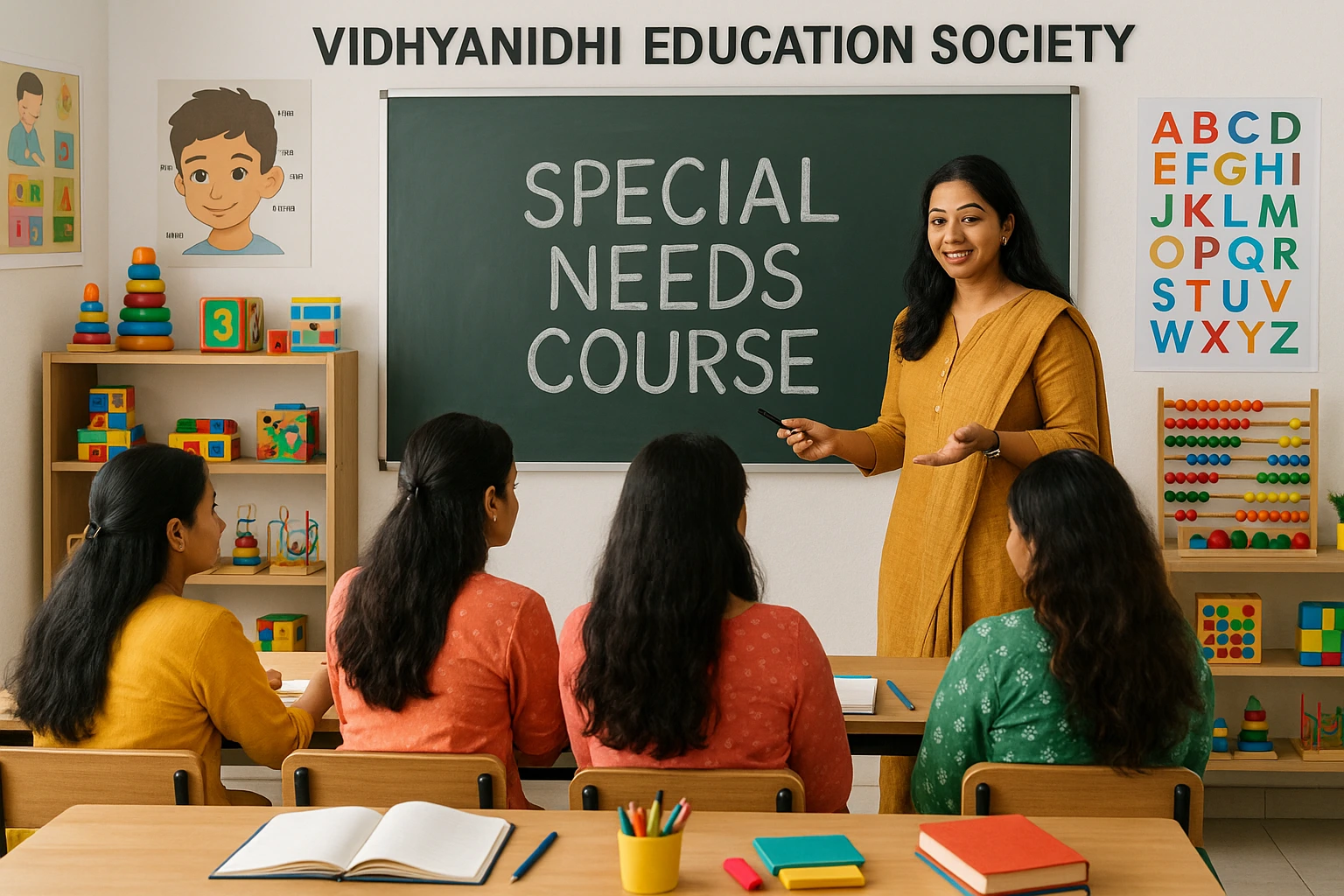
Source: ibhcounseling
Special Education in today’s educational scenario is an imperative component of the educational system. Entering the field of Special Education is a challenging task which requires painstaking efforts and a deep desire to make positive impact on the lives of young children with special needs.
Teaching Special Needs Children requires a great number of specialized skills and in-depth knowledge of the child development process covering all major domains of physical, cognitive, socio-emotional, and intellectual development.
For a flourishing career in the field of Special Education it is important to understand the ideal teaching courses for Special needs that will prepare you to get the grips with the major challenges posed by learning and intellectual disabilities.
Vidhyanidhi Education Society a pioneer Teacher Training Institute has initiated a top-notch job certifying program packed with comprehensive curriculum that encompasses the major aspects of learning disabilities and practical guidance by a team of adept professionals who possess years of valuable expertise.
What is the Curriculum of Teaching Courses for Special needs?
Children with special needs are often gifted individuals with high levels of intelligence but have their novel ways of processing spoken, written or visual information. So aspiring special educators must acquire the necessary skills and ways to cater effectively to the diverse learning needs of special children.
The Curriculum of Teaching Courses for Special Needs such include a wide array of learning disabilities and other disorders that hamper the learning skills and the functioning skills of a child confining him to a resource room. The curriculum should have adequate practical exposure to classroom handling and managing children in a regular classroom where you have children of varied needs gaining education together.
Core Components of the Curriculum:
Introduction to Special Education
Historical perspectives on special education. Key legislation and policies (e.g., IDEA). Ethical considerations in special education
Understanding Disabilities
This module comprises all the different learning disorders, behavioural disorders, and any physical ailments. Different disabilities have different features and are often affected by linguistic and cultural factors as well.
Assessment and Evaluation
Principles of assessment in special education. Formal and informal assessment tools.
IEP’s Individualized Education Programs
Learn how to design and implement IEPs based on the exclusive needs of the child.
Instructional Strategies
Evidence-based teaching methods. Classroom management strategies for diverse learners
Behavior Management
Emotional Regulation and Behavioral Interventions are needed to address the erratic behavior patterns and help build social-emotional skills in students.
Collaboration and Advocacy
Working with families of children with special needs. Interdisciplinary collaboration with other professionals.
Legal and Ethical Responsibilities
Understanding the rights and duties of teachers. Making it a point to help the child receive all the aid and assistance that they are entitled to concerning concessions and special benefits.
Practicum or Field Experience
Practical experience in special education settings. Observation, teaching practice, and reflection. Supervised mentorship to refine teaching skills
The Teaching Courses curriculum for Special Needs should equip teachers with skills and knowledge that help them create a conducive learning environment for children, fostering their overall holistic progress.

Source: istockphoto
What is the Scope of Completion of the Teaching Special Education Course?
Focusing on teaching children with varied needs and learning abilities, special education is a crucial aspect of education. After completing a special education teaching course, teachers have wide career options in addition to gaining the skills and knowledge necessary to meet these requirements.
Here’s a detailed look at the opportunities and prospects following such a course:
Special Educator
Work as a Special Educator in schools, private institutions, assessing children, diagnosing their condition, and using an effective strategic approach depending on the learning disability.
Inclusion Specialist
Master the art of designing an ideal classroom environment by incorporating various visual organisers, helping children learn better, and suiting their learning preferences.
Behavioural Consultant
Major in handling the behavioural aspect of children who possess behavioural and emotional disorders using exclusive techniques.
Academic Consultant
Gain proficiency in the legal domain of Special Education, helping schools adopt various laws and policies that work for the upliftment of children with special needs.
Speech and Language Pathologist Assistant
Support students facing communication challenges, often working alongside trained therapists.
Researcher
Contribute to the development of innovative teaching methods and educational tools for students with special needs.
Teaching Special Education is an exigent challenge that requires dedication, thorough knowledge, and skills that can make a major difference in the lives of young children, ensuring that every child gets a fair chance to receive education in a regular classroom and is not restricted to any separate learning space.
Individuals who have taken the plunge into the field of Special Education have to devote their time and energy wholeheartedly to impact the lives of children with special needs and their families, and raise confident young children.

Special Education Teaching Credential?
A Special Education Teaching Credential is an indispensable tool that helps aspiring teachers make a mark for themselves in this professional journey of being an accomplished special educator. Pursuing a Special Education Diploma helps trainees to build a solid foundation of knowledge about various learning disabilities and devise strategic approaches to help children handle the challenges of learning disorders.
This professional certification endows educators with impeccable aptitudes and flair, enabling them to offer the ideal assistance to young students, aligning the teaching process with their learning styles.
Importance of a Special Education Teaching Credential:
Professional Qualification
A Special Education Teaching Credential is a formal recognition of your expertise in special education. It is often required to work in specialized or inclusive educational settings.
Enhanced Teaching Skills
Provides training in evidence-based practices tailored for students with special needs. Develops the ability to create individualized learning plans and use assistive technologies.
Career Advancement
Unlocks gateways to roles such as Special Education Teacher, Inclusion Specialist, or Educational Consultant. Increases your employability in schools and organizations worldwide.
The Vidhyanidhi Education Society (Govt. Regd.) provides a meticulously designed Special Education Needs Course with several online advantages. Their program is aimed at preparing teachers for the hurdles and rewards of teaching special needs students, equipping them with the tools to prosper in this vital career.
Getting a Special Education Teaching Qualification is not merely a career choice, it is a promise to enhance the lives of students who require further support. With institutions like Vidhyanidhi Education Society (Govt. Regd.) providing flexible and easy-to-do online courses, this satisfying career route is within the scope of would-be teachers globally.
Ready to make a difference? Join Vidhyanidhi Education Society’s SEN Course and boost your career!
For more details on the SEN Course, Call/WhatsApp at +919321024137 / +919869866277
To download the brochure of the SEN Course, Click Here!
FAQs
What is the qualification for a special education teacher?
On procurement of a teaching license or certification, a special education teacher usually needs an undergraduate degree in special education or an allied field.
How to study special education?
Engage in application-based training, acquire awareness about various disabilities, join a special education program, and explore strategies and resources for inclusive teaching.
How do you become a certified special educator?
Attain certification through your local training institute after earning a degree in special education, fruitfully completing other requirements, and gaining practical teaching experience.



